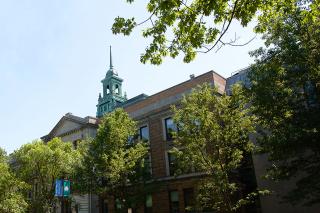Professor Zinnia Mukherjee first became interested in understanding the impact of economics on human lives while reading Charles Dickens’ novels during her school life in Calcutta, India. “Growing up [in India], I loved all the Dickens novels I read, particularly because they focused on the plight of ordinary human lives. I have always been curious about how decisions can be made to improve the quality of human lives and reduce suffering across the spectrum of human populations around the world,” she says.
Mukherjee notes that economics is a frequently misunderstood field of study. “The most common misconception is that economics is about money,” she says. “Economics is essentially about human decisions within a world of limited resources. It addresses such issues as biodiversity, property rights, and the role of women in markets, among countless others that affect our well-being as individuals and a global society.”
“I often tell my students that if we want to think about future generations and the world we leave behind, it will be the result of the decisions we make every day of our lives. Economics helps us to understand our impact on the planet,” Mukherjee says.
Researching Environmental Economics
Currently, Mukherjee is involved in two research projects on environmental economics. The first project uses country-level data to analyze the impact of economic growth on multiple environmental indicators across five continents (Africa, Asia, Europe, North America, and South America). Her preliminary findings indicate that while countries make progress on indicators they prioritize (e.g., carbon dioxide emissions), some of that progress is offset by increasing environmental damage from another environmental indicator (e.g., methane emissions).
“It could be that while a country is making progress by effectively using environmental policies to tackle one environmental problem, they are losing ground on another,” Mukherjee explains. “This study attempts to identify the countries that are making progress along multiple environmental indicators and are becoming more environmentally resilient relative to other nations.”
Mukherjee’s second research project focuses on understanding individuals’ attitudes toward their own environmental footprint.
“How much thought do we put into understanding the environmental impact of our individual choices?” she asks, citing choices such as buying and driving a car, food consumption, and energy consumption. While these choices have a global impact, some people are unaware of the environmental consequences and how we, as consumers, influence demand.
“This project is about how we can take a good, hard look at ourselves and see the impact of our decisions,” Mukherjee says.
Mukherjee’s scholarship stresses the importance of a global mindset. As an immigrant herself, she believes that her personal experiences helped her develop a broader perspective of both life and work.
“Our worldview can affect how we think about the relationships between our economic and overall human well-being, the management of natural resources, the environmental outcomes of economic progress, and sustainability, all of which are the focus of my scholarship,” she says.
Teaching Economic Approaches to Climate Change
Since coming to Simmons in 2013, Mukherjee has taught nearly a dozen different courses, including “Economics of Sustainability and Resource Use” (ECON 145), which focuses on markets for natural resource extraction and sustainable development; “Environmental Economics” (ECON 246), which focuses on designing various environmental policies; and “Writing Boston: Boston and Climate Change” (WRI 101), which addresses problems related to climate change in an urban context.
Mukherjee has also taught Simmons students through the PLAN (Purpose Leadership ActioN core curriculum, the Master in Public Policy (MPP) program, and SURPASs (Summer Undergraduate Research Program at Simmons).
“I love my environmentally-focused and public policy-focused courses because the discussions with my students are very engaging,” Mukerjee remarks. “The content in those courses provides opportunities for some great conversations with students.”
As Mukherjee finds, “students who come to Simmons generally seem to be socially-minded, in the sense that they want to contribute to the social good … Our students want to have a voice in the political dialogue of this country, and are naturally interested in environmental problems and how we can find solutions.”
The Applicability of an Economics Major
According to Mukherjee, economics is an excellent undergraduate major/minor because it is an essential part of a well-rounded education and has far-ranging applications.
“Economics is a discipline that allows you to branch out into many other disciplines in the future, including history, policy, sociology, gender studies, and psychology … By the very nature of its scope and content, it opens many pathways for further education across different fields of study.”
For example, economic history helps reveal why nations rise and fall. Home economics is key to managing households and family incomes. Moreover, as Mukherjee indicates, “You can’t be a good politician if you don’t have a basic understanding of economics. You can perhaps give a good speech and motivate people, but to understand human conditions in depth and the quality of human lives can be improved, you will need a good understanding of economics in order to make impactful changes.”
In short, Mukherjee encourages Simmons students to explore economics, which, in her words, “helps identify and create solutions to real-world problems.”

